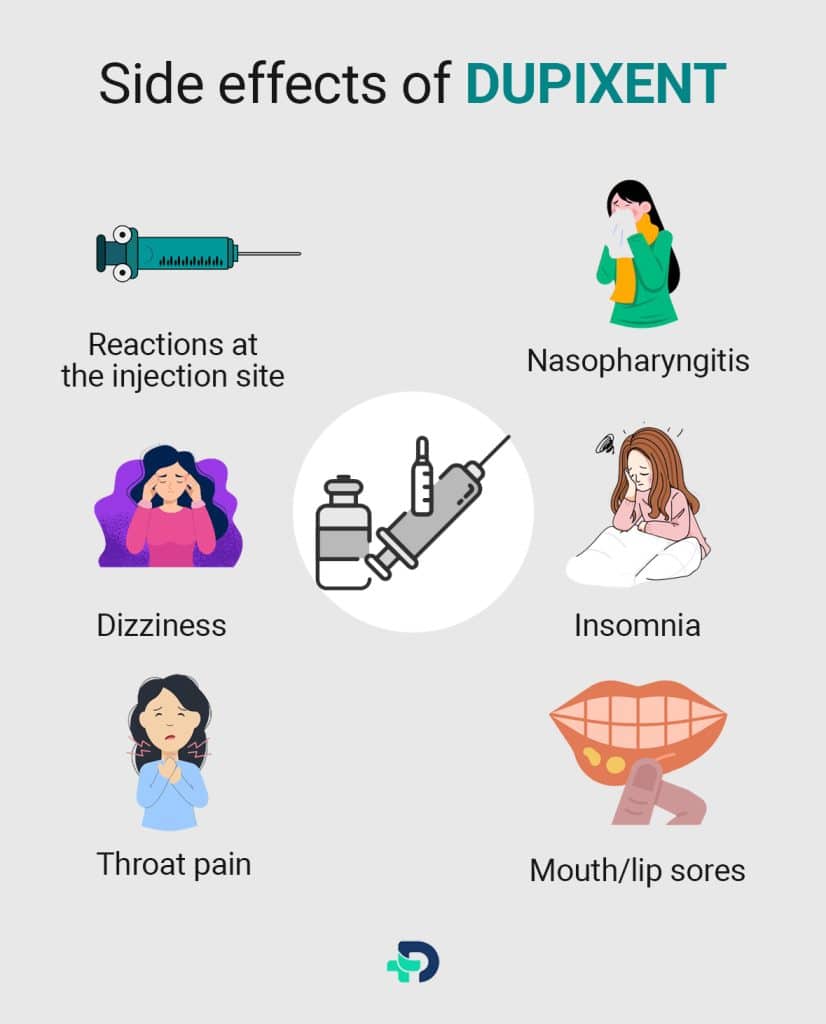Dupixent: Uses, Side effects, Precautions and Interactions

- Dupixent
- 22 Aug 2023
Overview
What is Dupixent?
Dupixent is a prescription medicine that contains an active ingredient called Dupilumab which belongs to a group of medicines called dermatological (a class of drugs used to treat, prevent, or care for the skin on a regular basis). It is generally used to treat moderate to severe eczema, asthma, nasal polyposis, or eosinophilic esophagitis in affected individuals.1Overview| Researched based study from Fda.gov

Uses
Dupixent – Uses & Indications
Dupixent is given to treat a variety of illnesses in both adults and children which includes:
- Eosinophilic esophagitis
- Chronic rhinosinusitis with nasal polyposis
- Asthma
- Atopic dermatitis
Eosinophilic esophagitis
- Eosinophilic esophagitis is an allergic inflammatory disease in which eosinophils (white blood cells) migrate in large numbers to the esophagus and cause tissue damage and inflammation when a trigger food is taken.
- Dupixent is generally used to treat the condition and provide relief from its associated symptoms when indicated for use in adults and children (aged 12 years and older).1Uses| Researched based study from Fda.gov
Atopic dermatitis
- Eczema, commonly referred to as atopic dermatitis, is a chronic (persistent) condition that causes skin irritation, redness, and inflammation in affected individuals.
- Dupixent is used to treat moderate-to-severe atopic dermatitis in individuals in whom topical prescription medications are insufficient to control the disease.1Uses| Researched based study from Fda.gov
Asthma
- Asthma is a chronic lung condition that affects people of any age, generally associated with symptoms such as cough, wheezing, shortness of breath, or chest tightness.
- Dupixent is used as an add-on maintenance therapy to provide relief from the condition which occurs either as moderate or severe asthma in affected individuals.
Chronic rhinosinusitis with nasal polyposis
- Chronic rhinosinusitis with nasal polyps is a chronic inflammatory disease of the paranasal sinuses and the nasal mucosa that is linked to substantial morbidity and reduced quality of life in affected individuals.
- Dupixent is used as an add-on maintenance therapy to treat the condition when it is inadequately controlled in certain patients.2Uses| Researched based study from Regeneron.com
Side effects

Side effects of Dupixent
If any of these signs are bothersome or do not go away, consult your physician for guidance:
Common side effects:
- Reactions at the injection site
- Infections of the upper respiratory tract
- Inflammation of the eyes and eyelids with redness, swelling, itching, and occasionally blurred vision
- Nasopharyngitis (common cold)
- Mouth/lip sores
- Increased count of eosinophils (a type of white blood cell)
- Dizziness, diarrhea
- Throat pain, muscle pain
- Gastritis (inflammation of the stomach lining)
- Arthralgia (joint pain)
- Insomnia (trouble sleeping)
- Toothache.
Uncommon/infrequent side effects:
- Facial rash or redness.1Side effects| Researched based study from Fda.gov
Serious side effects (that lead to discontinuation of treatment with Dupixent):
- Allergic reactions
- Eye problems
- Inflammation of blood vessels
- Joint aches and pain.
Allergic reaction
- Allergic reaction is a condition in which the immune system reacts abnormally to a foreign substance in a patient, generally characterized by symptoms such as breathing problems/wheezing, fast pulse, fever, swelling of the face, lips, mouth, tongue/ throat, hives/itching, nausea/vomiting, dizziness, and fainting.1Side effects| Researched based study from Fda.gov
Eye problems
- Following the administration of Dupixent, eye pain or visual abnormalities (such as blurred vision) may develop which may occur as a new or worsening eye issue.
Inflammation of blood vessels
- Rarely, this occurs in Dupixent-treated asthmatics which mainly occurs in individuals who concurrently use an oral steroid medication whose dosage is reduced or stopped. It is generally seen associated with symptoms such as worsening/shortness of breath, persistent fever, chest pain, and/or tingling or pickling sensation.3Side effects| Researched based study from Dupixent.com
Joint aches and pain
- It is possible for Dupixent users to experience joint aches and pains with associated symptoms such as difficulty moving or walking, and in other cases, requiring hospitalization. Any new or escalating joint complaints should be mentioned to your doctor before receiving Dupixent medicine.1Side effects| Researched based study from Fda.gov
Precautions
Precautions
Dupixent is not recommended for use if you suffer from the following conditions:
- In case Hypersensitive/allergic to Dupilumab.2Precautions| Researched based study from Regeneron.com
Inform your doctor if you experience the following effects:
- Conjunctivitis and Keratitis
- Arthralgia
Use with specific populations
Pregnant women
- Since it is unknown whether dupixent could harm an unborn child, it should be used with caution during pregnancy and in women who are planning to become pregnant only if absolutely necessary.
Nursing mothers
- Dupixent should only be administered to breastfeeding mothers under strict medical supervision because it is unknown whether the medication can cross into breast milk.3Precautions| Researched based study from Dupixent.com
Patients with any eye problem
- Inform your healthcare provider if you experience any new or worsening eye problems, such as eye pain or changes in your vision, including blurred vision. If required, your doctor might advise going to an ophthalmologist for an eye examination prior to taking the medication.
Patients suffering from parasitic (helminth) infection
- Patients suffering from pre-existing helminth (parasitic) infections should be treated first before initiating therapy with Dupixent medicine since it may alter the immune response against helminth infections and thus may increase the severity of the disease.
Use in children
- Dupixent should be administered with caution in children and adolescents (aged below 18 years) after consulting the doctor to avoid undesirable effects in this age group.
- In children 12 years of age and older, it should be provided by an adult, or under their supervision, but in children aged 6 months to 12 years, it should be administered by a caregiver.
Use in geriatric patients
- Elderly patients (65 years of age and older) should use Dupixent cautiously and only after seeing a doctor to prevent side effects.2Precautions| Researched based study from Regeneron.com
Interactions
Dupixent Interactions
Drug interaction
A lot of drugs can interact with Dupixent, and some drugs shouldn’t be taken at the same time. Please inform your physician of all additional medications you are taking.
This covers prescription and OTC medications as well as vitamins and herbal supplements with a few listed below:
- Midazolam (a medicine used before surgery or certain treatments to induce lethargy or drowsiness and to reduce anxiety)
- Warfarin (a medicine used for blood clot treatment and prevention)
- Omeprazole (used to treat certain stomach and esophagus problems (such as acid reflux, ulcers)
- Metoprolol (a medicine used to treat high blood pressure)
- Caffeine (a medicine used to restore mental alertness/wakefulness during fatigue/drowsiness).1Interactions| Researched based study from Fda.gov
Takeaway
Takeaway tips
- Dupixent helps to reduce inflammation by blocking a key source of inflammation
- The common side effect associated with the use of Dupixent are common cold, mouth/lip sores, dizziness, diarrhea, throat/muscle pain, gastritis, and/or arthralgia (joint pain)
- Dupixent does not broadly depress the immune system because it is neither a steroid nor an immunosuppressant
- As a preventative medication, Dupixent helps to keep you ahead of your disease
- Dupixent medication should be used precisely as directed by your physician. Your doctor will advise you on how much Dupixent needs to be administered/injected and whether or not self-administration is recommended.
Any feedback on this article?
 This Articles content was accurate
This Articles content was accurate Very Informative Article
Very Informative Article I have a question or a comment
I have a question or a comment
 This article contains inaccurate content
This article contains inaccurate content This article was not helpful
This article was not helpful I have a question or a comment
I have a question or a comment
We appreciate your helpful feedback!
Checkout our social pages
References
-
U.S FOOD & DRUG ADMINISTRATION
DUPIXENT - Prescribing information | Overview | Uses | Side effects | Interactions
-
Regeneron Pharmaceuticals
DUPIXENT® | Precautions
-
Sanofi US
DUPIXENT | Side effects | Precautions





































